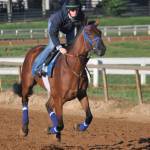Dorsal Displacement in Horses

Dorsal displacement of the soft palate (DDSP) is a misalignment of tissues in the horse’s throat. This condition, which is common in horses that work at high speeds, causes a drop in performance because affected horses are unable to breathe freely. Surgery to correct and prevent recurrence of the misalignment improves performance in many horses. This study looked at race records of affected horses before and after surgery. It also compared these records to racing performance of horses that were not affected with DDSP.
How was the study conducted?
Race records were obtained for 53 Thoroughbreds (21 intact males, 29 geldings, three females) that had been diagnosed with DDSP on the basis of clinical signs, history from jockeys, and endoscopic examination. Median age was 5 years, with a range of 2 to 10 years of age.
The horses underwent composite surgical treatment that involved staphylectomy, sternothyrohyoideus myectomy, and ventriculectomy (cutting of muscles and removal of tissue near the larynx), after which the horses were given time off training while they recovered. Median time from surgery to first post-surgical race start was 168 days (range of 38-812 days). Each horse was grouped with two normal control horses matched by age, sex, and trainer. Race earnings by DDSP horses for the three starts immediately prior to and following surgery were compared to similar results for the control horses.
What results were found?
Of the horses that had DDSP, 92% raced after recovering from corrective surgery. Post-surgical horses were more likely to start in three races than were the control horses during the same time. During this period, 60% of post-surgical horses had higher earnings than before surgery, while only 40% of control horses had higher earnings.
What does this study tell us about improving performance of horses with DDSP?
In this study, composite surgery seemed to improve the chance of a successful racing career for horses with DDSP. However, some interpretation of the results is necessary.
• Despite years of investigation, the cause of DDSP is still unclear. This possibly helps to explain why no single corrective procedure is successful in more than about 60% of treated horses. The authors point out that, in a study where six horses with DDSP were not subjected to surgery but were rested and treated with oral corticosteroids for four months, improvement in racing performance was seen in all horses.
• Some bias may have been introduced in the selection of which horses would have surgery to correct DDSP, as owners and trainers might be more willing to consider surgery for promising horses rather than for those with less ability. In other words, it is possible that horses chosen for surgery had already shown themselves to be more athletic than the control horses, so they were preselected for greater success following treatment.
• Although more surgical horses than control horses showed improved earnings in later races, it is significant that 40% of control animals were also more successful during this period. This can be interpreted as a natural improvement due to training, experience, or other factors, and suggests that improvement was not strictly due to surgical treatment in every case.
The authors state that, despite these considerations, composite surgery is an effective treatment for many horses with DDSP, and until an alternate and superior technique is developed to manage the condition, this treatment can be justified.
Barakzai, S.Z., V.S. Johnson, D.H. Baird, B. Bladon, and J.G. Lane. 2004. Assessment of the efficacy of composite surgery for the treatment of dorsal displacement of the soft palate in a group of 53 racing Thoroughbreds (1990-1996). Equine Veterinary Journal. 36:2:175-179.








